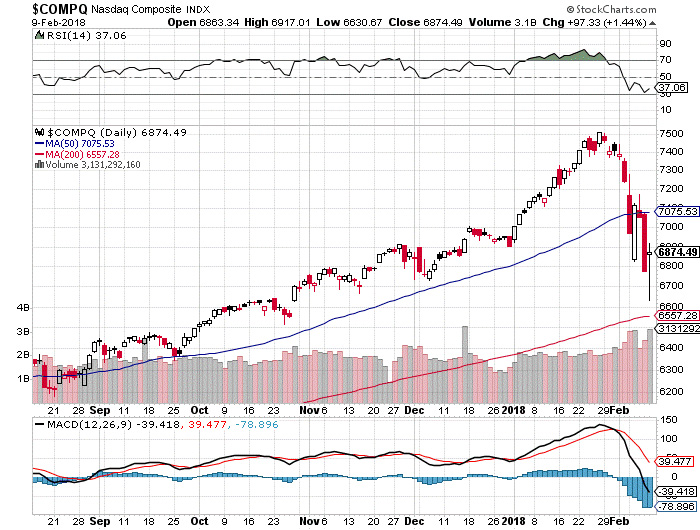February has been a brutal month for stock markets. The boom that gripped the markets in December has started to wane somewhat. From historic highs, we are now trending towards multi-year lows. But, should we be concerned? At first glance, the status of financial markets appears to be deeply disturbing. Consider the 1-month performance of the following 3 US bourses:
- The NASDAQ Composite index is down 5.32% and is now trading at 6,874.49
- The S&P 500 index is down 5.98% and is currently trading at 2,619.55
- The Dow Jones Industrial Average is down 6.25% and is currently trading at 24,190.90
While certainly worrying, these levels are a little misleading. The above chart reflects the performance of the NASDAQ composite index. It is clear that the current level of 6,874.49 is lower than the 50-day moving average of 7,075.53, but markedly higher than the 200-day moving average of 6,557.28. The 52-week trading range of the NASDAQ is 5,717.42 on the low end and 7,505.77 on the high-end. Markets are currently at their midway point. Similar trends are evident in the Dow Jones Industrial Average, and the S&P 500 index.
Why are stocks so bearish?
There are many reasons why traders, investors, and speculators have decided to go short on equities markets globally. For one thing, there is growing concern that rising inflation and a trend of interest rate tightening will not bode well for equities markets. This is not to say the fundamentals of the US economy, or the European economy are structurally imbalanced. On the contrary – the fundamentals of these economies are strong.
Unemployment sits at 4.1% in the US, and the January jobs numbers were robust at 200,000, but inflation is ticking up. The recently approved tax overhaul will see many US companies like Apple Incorporated, Walmart and others increasing the salaries of their employees. This is giving rise to inflationary pressures in the economy. To combat inflation, the central bank looks towards things like increasing the federal funds rate.
An era of interest rate tightening is upon us
Since December 2015 we have witnessed a steady stream of interest rate hikes in the markets. These 25-basis point rate hikes have fuelled speculation that quantitative tightening is here to stay. Unfortunately for US households and businesses with lines of credit that need to be repaid – this is not a good thing. There are 2 primary reasons why rising interest rates do not bode well for the stock market:
- Listed Companies owe the banks a lot of money via business loans and other financing options. When banks increase their lending rates, these companies suffer in terms of profitability.
- US households also have debt repayments to make and the personal disposable incomes of families are also negatively impacted when interest rates rise. This directly impacts their buying power. When households are spending less, the value of listed companies decreases.
Olsson Capital finance guru, Matthias Schrodinger believes that traders and investors can benefit from the stock market downturn in several ways.
«For starters, I encourage traders to understand that the markets are not trending bearish – they are merely correcting towards a more appropriate, or true value. We had hyperinflated figures for stocks for several years. Now, you have an opportunity to get back into the markets for what we call value trades.
Plus, we’re also seeing caution being exercise in the financial markets where traders are diversifying their portfolios with things like derivatives trading in cryptocurrency, CFDs and the like. If you cannot make money from an asset rising in value, you might as well make money from an asset falling in value. This is precisely what we can do with derivative trading instruments. It’s a great hedge against the current short-term bear market.»
Sources: bloomberg.com / finance.yahoo.com
Related Posts
« The future of cryptocurrency liquidity looks brighter with Bancor To be a successful forex trader, understand intermarket relations »











